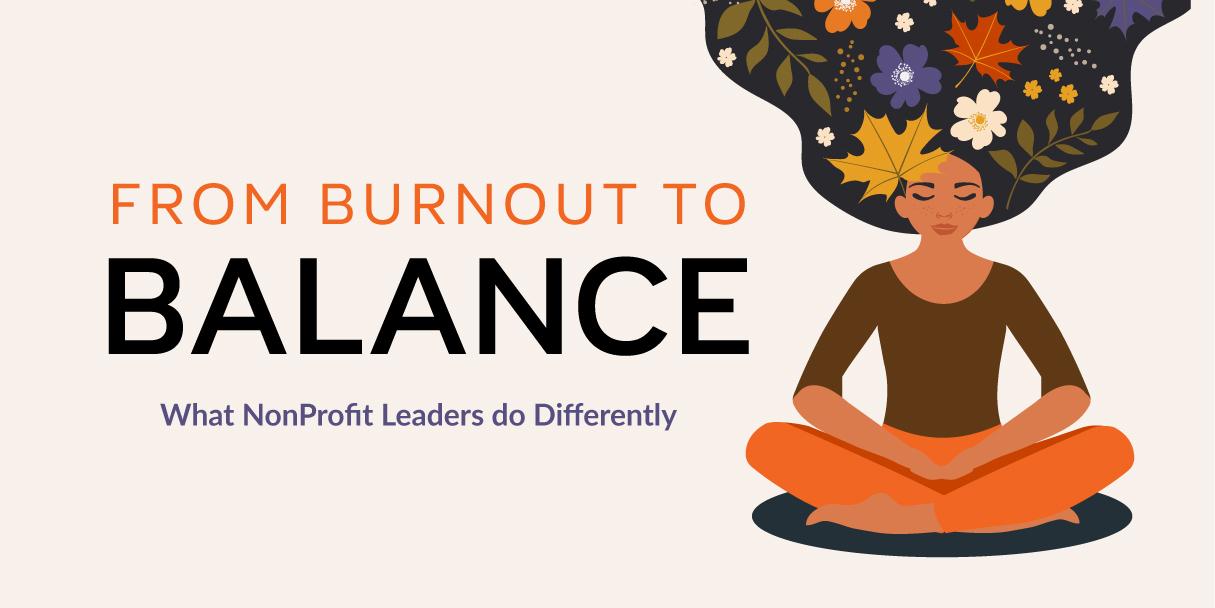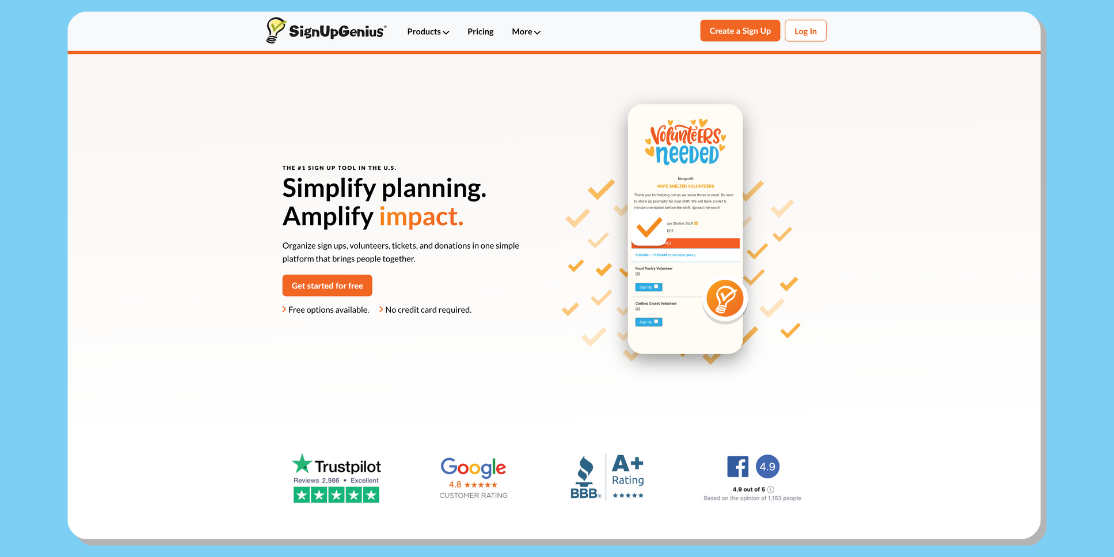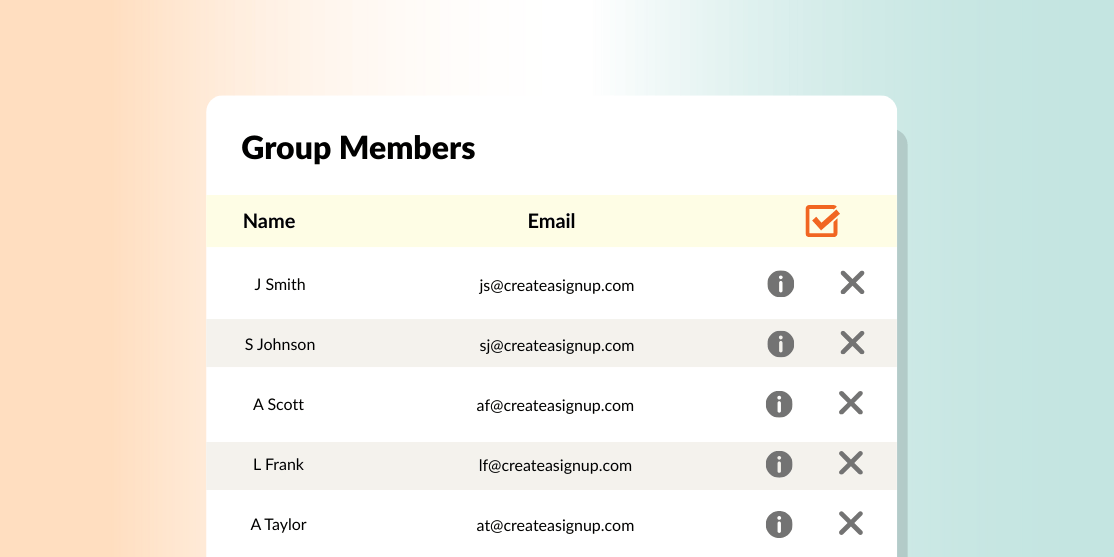From Burnout to Balance: What Great Nonprofit Leaders Do Differently

Avoid nonprofit burnout with these 4 strategies from successful leaders. Learn to set boundaries, delegate, and prioritize your mission for long-term impact.
Quick Summary
- Set Boundaries: Define your work hours and protect personal time to avoid constant overwork.
- Delegate & Empower: Share responsibilities with your team and volunteers so you can focus on strategy and vision.
- Prioritize Mission-Driven Work: Evaluate tasks regularly to make sure your time aligns with your organization’s purpose.
- Invest in Self-Care: Treat rest and renewal as essential leadership tools, not optional luxuries.
- Use Tools to Simplify Logistics: Platforms like SignUpGenius streamline volunteer coordination and event management, freeing up energy for what matters most.
The Nonprofit Reality: When Passion Turns to Pressure
Leading a nonprofit is more than a job; it’s a calling. You care deeply about your mission, whether that’s feeding families, mentoring students, or supporting local arts. But this dedication often comes with long hours, limited budgets, and constant fundraising pressure. You’re managing volunteers, answering donor emails, preparing for next week’s gala, and still trying to get home in time for dinner.
It’s no surprise that 95% of nonprofit leaders report feeling burned out.¹
Finding balance isn’t a luxury; it’s a leadership necessity. The most effective nonprofit leaders have learned to protect their energy and focus on what truly drives impact. Here’s what they do differently - and how you can follow their lead.
1. Set and Protect Firm Boundaries
Nonprofit work never really ends. There’s always another grant proposal to write or one more donor to call back. But the most sustainable leaders know that saying yes to everything means saying no to yourself.
Scenario:
Maya, who runs a local animal rescue, used to answer adoption inquiries at all hours - sometimes even while brushing her teeth. After realizing her exhaustion was affecting her team’s morale, she started setting clear office hours and created an FAQ page on her website to handle common questions. The result? Fewer late-night emails, more rest, and a team that followed her lead in protecting their own time.
What Great Leaders Do Differently:
They view boundaries not as barriers, but as leadership tools that protect their ability to think clearly and lead effectively.
Genius Tips:
- Define Your Work Hours: Commit to “office hours,” even if your work is hybrid or flexible. Communicate them to your board and volunteers.
- Schedule “Off” Time: Add personal appointments - like workouts, reading, or family time - to your calendar so you treat them as non-negotiable.
- Model the Behavior: When staff or volunteers see you respecting your own limits, they’ll feel empowered to do the same.
2. Empower Your Team and Delegate Effectively
When you care deeply about your mission, it’s easy to think no one else can do it “quite right.” But holding too tightly to every detail leads straight to burnout, and limits your organization’s growth.
Scenario:
Carlos, executive director of a community food pantry, used to handle every delivery schedule himself. Once he started using SignUpGenius to coordinate volunteer shifts and driver routes, he realized he didn’t have to micromanage.
Volunteers signed up for slots that fit their schedules, and automatic reminders kept everyone on track. Carlos reclaimed hours each week—time he now spends meeting with donors and expanding programs.
What Great Leaders Do Differently:
They delegate not just tasks, but trust. They train and empower their people, then step back to let them shine.
Genius Tips:
- Start Small: Hand off one recurring task this week - maybe social media scheduling or volunteer check-ins - and build from there.
- Provide Context: Share the “why” behind each task so your team feels ownership, not obligation.
- Use SignUpGenius: Streamline volunteer management by setting up sign ups for events, shifts, or committee work. Automated reminders and visibility reduce your need for follow-up.
3. Prioritize Mission-Aligned Activities
The to-do list for nonprofit leaders is endless: emails, reports, grant updates, social posts, donor thank-yous. But not every task is mission-critical. Great leaders regularly refocus on what truly drives their impact.
Scenario:
Alicia, who directs a literacy nonprofit, realized her team was spending hours every week setting up book drives with little return. After reviewing outcomes, she discovered that school partnerships produced far greater impact. Now, her staff prioritizes relationship-building with teachers over one-off events, and their reach has doubled.
What Great Leaders Do Differently:
They continually align their daily work with their mission. When something doesn’t serve that mission, they adjust quickly.
Genius Tips:
- Do a “Mission Audit”: Review your calendar weekly and ask, “Does this task move the mission forward?”
- Share Impact Stories: Remind your team why their work matters by spotlighting real community results.
- Celebrate Wins: Recognize moments of progress - like a new partnership or a successful fundraiser - to stay motivated and focused.
4. Invest in Self-Care and Renewal
Many nonprofit leaders feel guilty stepping away from their mission, but the truth is: you are one of your organization’s greatest assets. Taking care of yourself is taking care of your mission.
Scenario:
Nadia, a youth mentorship program director, used to skip vacations “for the sake of the kids.” But after facing near burnout, she took a week off, leaving her assistant director in charge. When she returned, she realized her team had handled everything beautifully - and she came back with renewed creativity and focus.
What Great Leaders Do Differently:
They schedule rest with the same discipline they schedule board meetings. They understand that leadership longevity depends on physical, mental, and emotional recovery.
Genius Tips:
- Plan Mini Recharge Moments: Take a daily walk, stretch between meetings, or enjoy coffee away from your desk.
- Join a Peer Network: Connecting with other nonprofit leaders provides perspective and emotional support.
- Practice Mindfulness: A few deep breaths before a board meeting can shift your entire mindset.
How SignUpGenius Can Help
Running a nonprofit means juggling people, projects, and priorities. SignUpGenius helps you simplify the chaos so you can focus on what matters most: your mission.
Coordinate volunteer shifts, schedule meetings, and assign tasks in just a few clicks. Automated reminders keep your team on track, while shared sign ups reduce endless email threads. Whether you’re organizing a fundraiser, food drive, or mentorship event, SignUpGenius helps you lead with less stress and more impact.
Lead Your Mission Without Losing Yourself
You started this work because you believe in making a difference, not because you wanted to live in a constant state of exhaustion. By setting boundaries, empowering your team, staying aligned with your mission, and prioritizing self-care, you can lead with both heart and balance.
Choose one small change to implement this week. Your mission - and your well-being - will be stronger for it.
Frequently Asked Questions
Q: What causes burnout for nonprofit leaders?
A: Burnout often comes from juggling too many roles - leader, fundraiser, HR manager, and program coordinator - all at once. The sense that “the work is never done” can leave leaders drained and disconnected from their purpose.
Q: How can I start preventing burnout right away?
A: Start by setting one clear boundary this week - like turning off email after 6 p.m. or delegating one recurring task. Small, consistent shifts lead to lasting change.
Q: What role does delegation play in reducing burnout?
A: Effective delegation frees up your time for strategy and vision work while empowering your team to grow. It builds organizational resilience and boosts morale.
Q: Is it selfish to focus on self-care as a nonprofit leader?
A: Not at all. When you’re rested, you bring better energy, creativity, and leadership to your cause. Self-care is mission care.
Q: How can tools like SignUpGenius help with balance?
A: SignUpGenius simplifies scheduling, volunteer management, and event coordination - reducing the mental load so you can focus on impact, not inboxes.
¹ Thompson, I. (2024, July 2). Burnout and Staffing Shortages Continue to Challenge Nonprofits. SOURCE.


